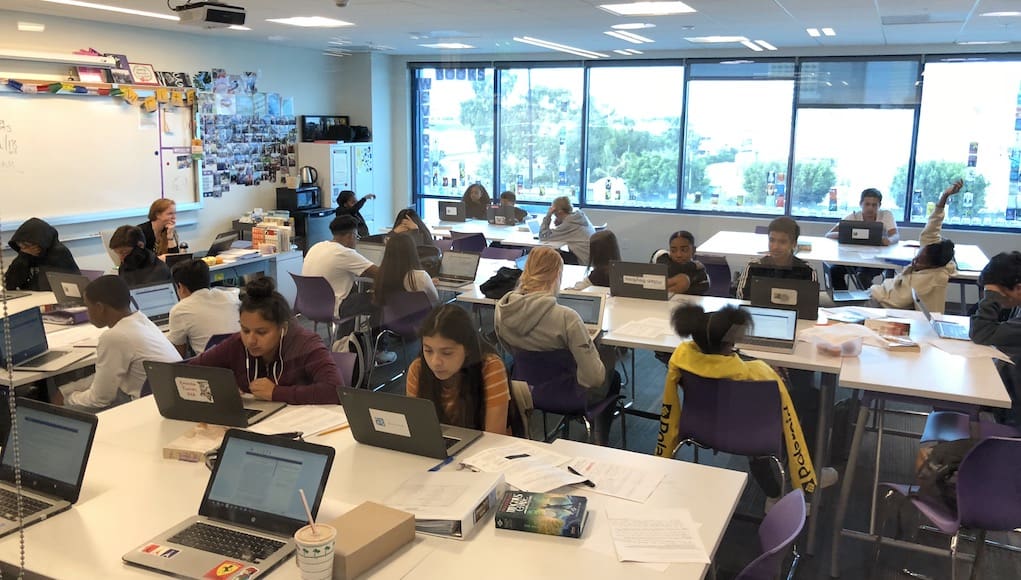Forget Replication, Transforming Learning is About Remixing

By: Tony Siddall
How do you replicate the most innovative schools in the country? It’s a trick question. The answer is that you don’t.
Over the last year, our team at Next Generation Learning Challenges (NGLC) has spoken with the leaders of many of the most innovative schools in the country. While they’re intensely committed to sharing what they’ve learned, few are interested in “replication” as it is traditionally understood. As Jin-Soo Huh of Distinctive Schools recently argued, “cookie cutter” replication of personalized learning models runs counter to the core principle of these models: personalization.
The school designers and re-designers we’ve spoken with feel the same way. It’s not that they want to start from a blank slate. In fact, they’re ravenous to get into the nuts and bolts of model schools. But rather than replicating a model, many want to begin with the unique assets of their communities (including current teachers and students) and design their schools around these assets.
In other words, they don’t want to replicate, they want to remix.
It turns out our partners at Da Vinci Schools and Schools That Can have been thinking (and designing) along some very similar lines. Together we asked ourselves, how might our networks link together to create something greater than the sum of its parts? And together, we launched the Transforming Learning Collaborative.
The Transforming Learning Collaborative (TLC) is a national group of innovative schools committed to sharing their signature practices and creating a sustainable national ecosystem of educator-to-educator learning. We began this fall with the Transforming Learning Conference, designed and hosted by Da Vinci Schools. The conference was also the kickoff of the Transforming Learning Incubator, an intensive year-long learning and design experience serving an inaugural cohort of six teams of educators.
The TLC is trying to solve two related challenges that we believe are among the greatest obstacles to growing the number of radically student-centered, community-connected, technology-enabled schools (what we at NGLC call next-gen schools):
- The true experts in next-gen school design are currently leading schools. This is not to diminish the expertise of the many excellent advisors and researchers out there. Rather, it reflects that in school transformation the devil is in the details, and the folks who understand these details best are those who are grappling with them on a daily basis.
- When you’re leading an innovative school, you don’t have a ton of extra time to codify and connect outside your school. The schools that have been most successful in sharing their models have typically been the ones that create a new organizational function dedicated to training and dissemination (what NewSchools calls “model providers”). This is an incredibly powerful approach, but many innovative schools aren’t necessarily interested in the fundraising and organization-building that comes along with it. So how can these smaller schools codify and share their signature programs and practices with a broader audience?
To solve these challenges, we designed the TLC to make it as easy as possible for innovative schools and districts to develop professional learning experiences, and to help school designers across the country access these experiences. In the Transforming Learning Incubator, mentors (who are current instructional and network leaders) work with Incubator participants (i.e., new school designers or existing school teams eager to innovate) to create a learning pathway that brings participants to multiple pioneering schools across the country. These are not just site visits—they’re structured learning and design intensives with time to go deep on specific practices and school structures.
The value for Incubator participants is straightforward. If they’re interested in project-based learning, for example, they learn exactly how it happens at multiple schools, and they have a mentor to help them pick, choose, and adapt the elements that best meet the needs of their community. So what’s in it for members of the Collaborative, who are adding to their already full plates to create these learning experiences? A lot, as it turns out. As Kaitlin Toon, one of the TLC mentors at Da Vinci, explains:
One of the greatest gifts to come from serving as a mentor is the opportunity to collaborate with passionate, like-minded educators. So often in our roles, we are inundated with the important work to be done at our site, which doesn’t allow us to see past our own horizon. Being able to collaborate and explore with a team of people who are on the brink of innovation in their own community not only rejuvenates my passion for “the work,” but allows me to learn alongside them and experience this huge and important shift happening in education from a new perspective.
Being a TLC mentor is a powerful and rewarding professional growth opportunity. Creating professional learning for external educators is a chance to do the reflection and documentation that takes existing materials to the next level. And of course, mentors and site visit hosts are paid for their time.
Education “reform” has earned a reputation as something that is faddish, top-down, and short term. What would happen if we fell out of love with buzzwords and invested in connecting educators to learn, imagine, and create together? With the Transforming Learning Collaborative, we’re going to find out.
For more, see:
- Da Vinci Schools Expand Opportunities in Los Angeles
- Where Place-Based Ed Fits Into NGLC’s Fields of Learning
- K-12 Breakthrough School Models from NGLC
Tony Siddall is the program officer for Next Generation Learning Challenges. Connect with him on Twitter @horacemanifesto.
Stay in-the-know with innovations in learning by signing up for the weekly Smart Update. This post includes mentions of a Getting Smart partner. For a full list of partners, affiliate organizations and all other disclosures, please see our Partner page.






0 Comments
Leave a Comment
Your email address will not be published. All fields are required.